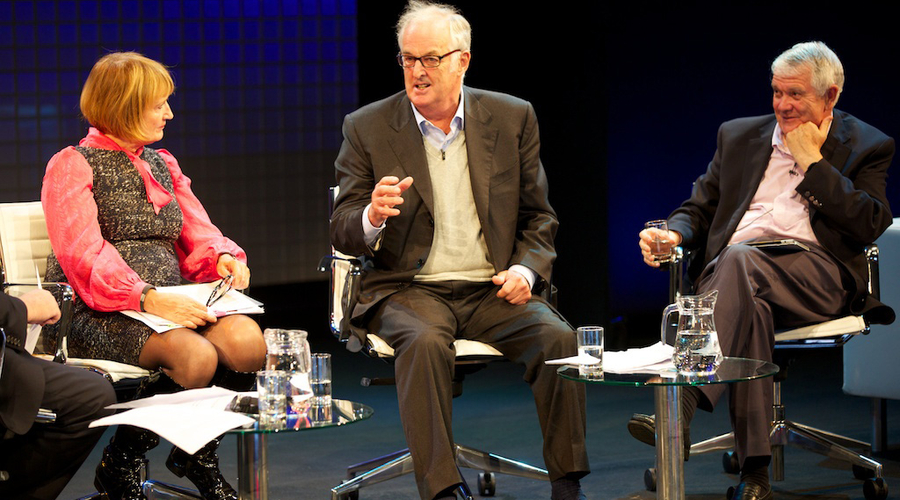Is the BBC Trust bust? That was the question at the heart of this last-minute session, added to the Convention timetable to tackle the governance issues raised by the row over exactly who approved contentious executive pay-outs at the BBC.
Being quizzed by chairman Steve Hewlett were: the Rt Hon Dame Tessa Jowell MP, former secretary of state at the DCMS; Sir Christopher Bland, former chairman of the BBC Governors; and Lord Burns, chairman of Channel 4 and former chairman of the Burns Committee.
The Trust took shape on Jowell’s watch, and Burns’s committee advised against setting it up. It quickly became apparent that they still did not see eye to eye on the issue.
Jowell was clear that the Trust is not bust – there had simply been a misunderstanding of the nature and purpose of the BBC Trust, allied to a past culture of inward-looking BBC executives failing to consider how their decisions would look in the light of public scrutiny.
“I hope it is now a historic problem,” said Jowell. “The policy or practice of leaving for another job with hundreds of thousands in your pocket was… dysfunctional. We have to stop describing the Trust as the cheerleader for the BBC. It is not. It is the advocate for the licence-fee payers – they are the sovereign body.
“I don’t believe we were creating inherent structural flaws. Yes, any new structure will need tweaking. I still believe it is the right structure for the BBC and that the licence fee is sustainable.”
Burns disagreed with the first part. He wanted a unitary board for the BBC, with a chairman and a majority of non-exec directors – and a separate body to look after the interests of the licence-fee payers.
Burns said: “The director-general currently has no chairman to talk to in a crisis – only the chair of the Trust, who is responsible for regulating the BBC – [my committee] did foresee that as a problem.”
He said the crucial thing was to have an external regulator of the BBC – he was neutral about whether that regulator was Ofcom.
Sir Christopher Bland said the Public Accounts Committee appeared to want the chairman of the BBC Trust to act as chairman of the BBC – something he could not be.
“That clear blue water [between Executive Board and the Trust] is fine when things are calm, but they rarely are at the BBC, and the water gets choppy,” said Bland.
He also voted for a unitary BBC board and a separate regulator: “There is no problem giving this role to Ofcom – it handles disputes between Channel 4 and Channel 5.”
But Bland was insistent that it wasn’t the BBC Trust that failed: “It was the Remuneration Committee of the BBC Executive Board and HR that failed.” He said the BBC’s strategy of quickly cutting the executive payroll had been sensible.
Asked about the secretary of state’s intention to strengthen the investigative powers of the National Audit Office, Bland said: “The NAO is the most politicised auditor you can imagine. It judges success on whether it gets a headline.’
James Purnell, BBC director of strategy and digital, was in the audience. He was asked if the corporation would be happy to see the NAO given increased powers to investigate the BBC.
“We are happy to talk to them… The NAO getting documents more regularly is fine,” he said, but clarified that editorial decisions should remain off limits.
He added that returning to the BBC after a gap of 20 years, he had found the corporation “much more enmeshed with Whitehall and Westminster than we were in the past. If we went significantly further [it could pose a threat to independence].”
Only 11% of the Cambridge audience agreed with the secretary of state, Maria Miller MP, that the NAO should be given unhindered access to BBC financial papers.
Moreover, three-quarters of them disagreed with her – and also with the two of her predecessors present at Cambridge, Jowell and Purnell – on governance. The audience voted solidly for a unitary BBC board and Ofcom supervision. In their view, the BBC Trust is bust.
The session was produced by Sue Robertson and Sophie Jones.
Report by Gordon Jamieson. Photo by Paul Hampartsoumian.

